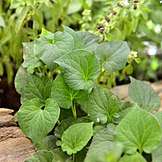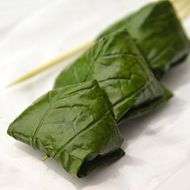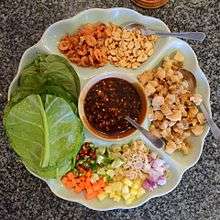Miang kham
Miang kham (or "mieng kham", miang kam, miang kum; Thai: เมี่ยงคำ, pronounced [mîaŋ kʰām]) is a traditional Southeast Asian snack from Thailand and Laos (Lao: ໝ້ຽງ Lao pronunciation: [mȉaːŋ]). It was introduced to the Siamese court of King Rama V by Princess Dara Rasmi.[1]
Miang Kham before wrapping | |
| Type | Snack |
|---|---|
| Place of origin | Mainland Southeast Asia |
| Region or state | Southeast Asia |
| Associated national cuisine | Thailand and Laos |
The name "miang kham" translates to "one bite wrap", from miang (food wrapped in leaves) and kham (a bite).

Ingredients
Miang kham mostly consists of raw fresh Piper sarmentosum (Thai: ชะพลู, RTGS: chaphlu) or Erythrina fusca (Thai: ทองหลาง, RTGS: thonglang)[2] leaves that are filled with roasted coconut shavings and the following main ingredients chopped or cut into small pieces:
Background information
Miang kham is a snack food that originated in the northern part of Thailand, originally using pickled tea leaves (called miang in the northern Thai language).[3][4] The dish is mentioned in Epic of the Verse of foods, a book written by the King Rama II.[5] In Thailand, Miang kham is usually eaten with family and friends. It is also popular in the Central Region of Thailand. This dish is mostly eaten during the raining season for it is then that cha phlu leaves are abundantly available, as it grows new leaves and shoots.
Before wrapping the filled leaves are topped with palm syrup or sugar cane syrup which often has been cooked with lemongrass, galangal, ginger and fish sauce.[6]
Miang kham bags for sale in Bangkok. |
 Wrapped Miang kham |
 Miang pla, with Chinese broccoli leaves |
Variants
- In Vientiane, the capital of Laos, miang is often folded in cooked cabbage leaves (kaalampii) or lettuce. Alternately, other leaves, such as spinach, can be used.[7]
A variation called miang pla includes pieces of deep-fried fish in addition to the standard ingredients.
- In Thai royal cuisine in the central part of Thailand, have an alternate of wrap that adept the dish to represent of beautiful and social status e.g. Miang Kreep Bua or Miang Kham Bua Lhuang
Miang Kham Bua Lhuang (Thai:เมี่ยงคำบัวหลวง) is a snack dish originated in Thai royal cuisine in the central part of Thailand. Miang Kham Bua Lhuang (Eng: Lotus petals wrapped bite-size appetizer) is usually eaten with family and friends. This dish is mostly eaten as appetizer or snack during the meals. The name "Miang Kham" means "one bite-size wrap". Form Miang (snack wrapped in piper sarmentosum leaves) and Kham (one bite) in Thailand (Miang Kham, 2018.). Normally, this dish can have many types of wrap such as Piper sarmentosum (Thai:ใบชะพลู) and pickled tea leaves (Thai:ใบเมี่ยง)which are originated in the north of Thailand.
- Ingredients
When talking about "lotus" most people might think of lotus as offering to monks and Buddha. Actually, lotus petals can be eaten with many nutritional benefits e.g. high fiber for detoxifying and nourishing health. Also it can be cooked in good side dishes such as Ingredients of Miang Kham Bua Lhuang (Miang Kham Bua Lhuang, 2012),[8] with other ingredient e.g. shallots, chili peppers, gingers, garlic, limes, coconut sugar. (Miang Kham Bua Lhuang Thai traditional snack food for good health,2012).[9]
References
- "เมี่ยงคำ ; Miang kham - A royal leaf wrap appetizer". Thaifoodmaster. 2016-05-23. Retrieved 2016-05-24.
- ทองหลาง
- Hanuman, Thaan Khun and Chef Thapakorn Lertviriyavit (Gorn) (May 23, 2016). "Miang kham - A royal leaf wrap appetizer เมี่ยงคำ". Thaifoodmaster. Retrieved 2019-06-10.
- "Miang - Lanna Food - Northern Thai Information Center, Chiang Mai University Library". library.cmu.ac.th.
- "Thai Food by King Rama II กาพย์เห่ชมเครื่องคาวหวาน by รัชกาลที่ 2". The SW Eden. 27 November 2009.
- Pictures of the Miang kam preparation process Archived 2011-09-04 at the Wayback Machine
- Miang Kam recipe Archived 2012-07-31 at Archive.today
- "สูตรอาหาร "เมี่ยงคำบัวหลวง" ทั้งอร่อยทั้งดีต่อสุขภาพ". MThai Food. 2012-05-30. Retrieved 2018-04-25.
- "เมี่ยงคำบัวหลวง อาหารไทยเพื่อสุขภาพ". MThai Food. 2012-05-28. Retrieved 2018-04-25.
External links
| Wikimedia Commons has media related to Miang kham. |